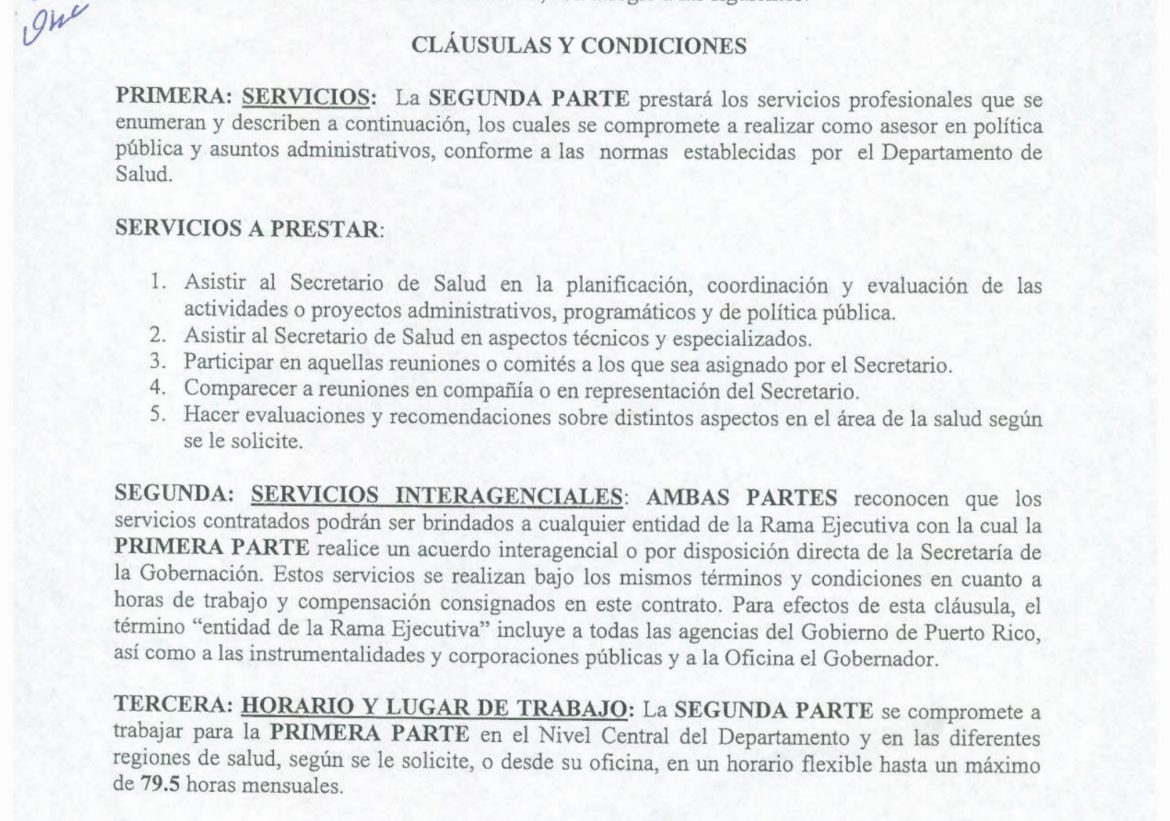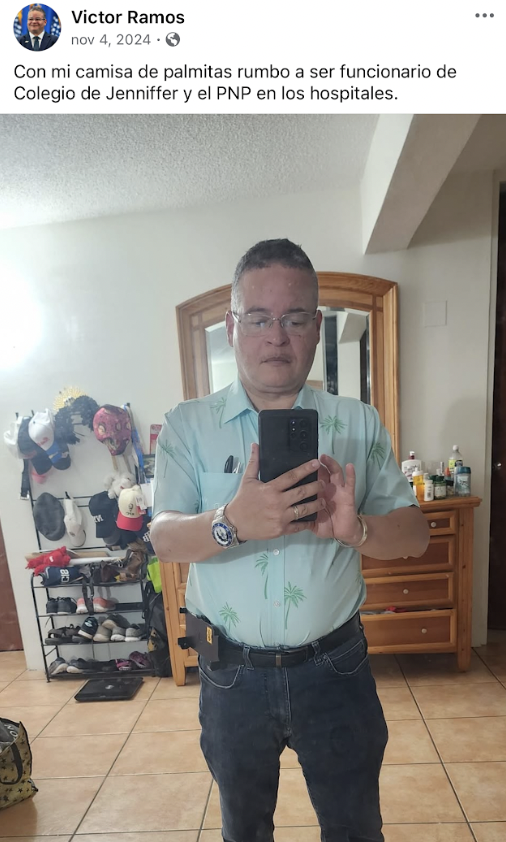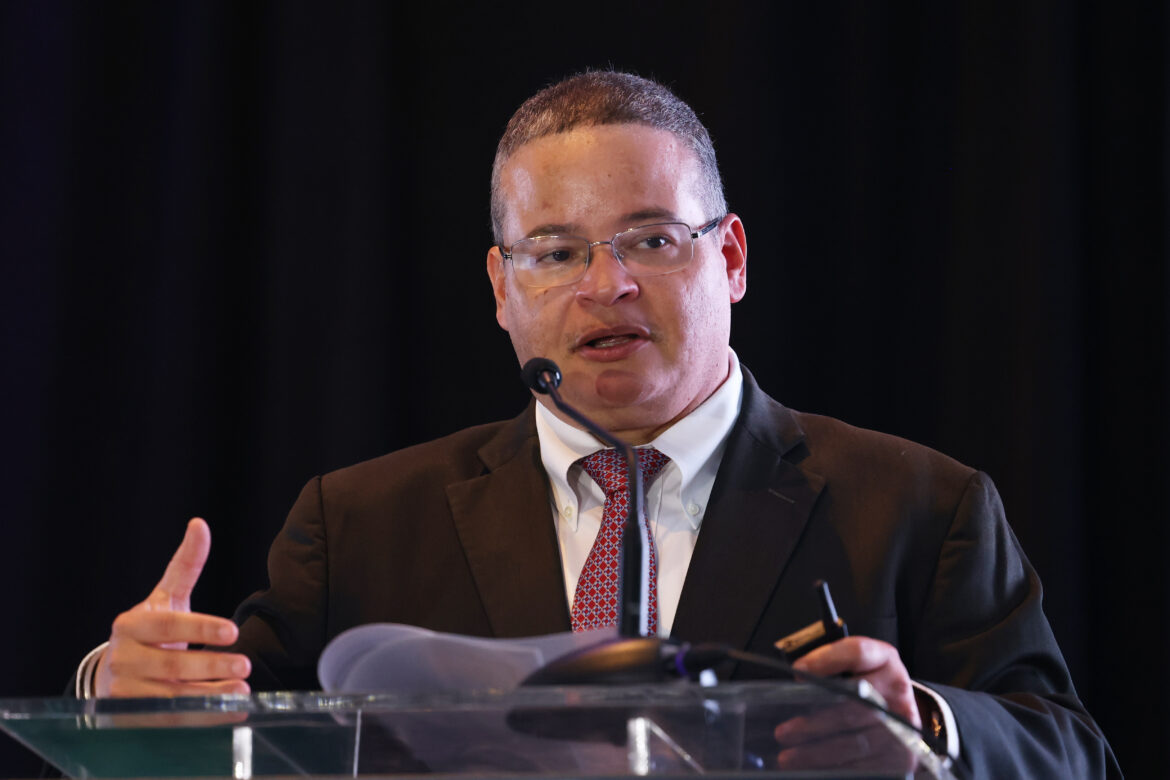Before being confirmed, the nominated Secretary of Puerto Rico’s Department of Health, Víctor Ramos Otero, who faces corruption allegations including mismanagement of private and public funds, nepotism, and involvement in a suspected signature forgery scheme, placed a group of doctors in the agency who have been part of his support group to secure his confirmation by the Senate.
These doctors, who shared responsibilities with Ramos Otero during his presidency at the Puerto Rico College of Physicians and Surgeons (CMCPR, in Spanish), will not receive financial compensation. However, they will have access to meetings and committees representing the Secretary of Health, and they will be able to conduct evaluations and make recommendations within the agency for planning, coordination, and evaluation of administrative, programmatic, and public policy projects, among other tasks described in the contracts registered with the Office of the Comptroller (OCPR, in Spanish).
Former Secretary of Health Enrique Vázquez Quintana told the Centro de Periodismo Investigativo (CPI) that the services provided by these contractors are like the duties of a deputy secretary. Service contracts with duties similar to a position are not allowed in government administration, according to Act No. 237-2004.
Doctors Hiram Luigi Sánchez, Luis Flores Torres, Roberto Pérez Nieves, and Javier Cuevas Marrero, who specialize in orthopedics, gynecology, plastic surgery, and pediatrics, respectively, will dedicate up to 79.5 unpaid hours per month to “assist” Ramos Otero in his role as Secretary of Health, according to agreements signed by the Department of Health between January and March.
During his confirmation process, almost all these doctors and contractors have publicly defended Ramos Otero against allegations of corruption made by CMCPR President Carlos Díaz. Only Cuevas Marrero, president of the Grupo Hospitalista Pediátrico, for which Ramos Otero worked, has not made public statements to date. Cuevas Marrero was deputy secretary and secretary during Ramos Otero’s tenure at the CMCPR. Ramos Otero still works night shifts at San Jorge Hospital with a waiver, while Cuevas Marrero runs the regenerative medicine clinic Wellness Architects and is the director of attending physicians at San Jorge Hospital.
The CPI requested an interview with the nominated secretary Ramos Otero to explain the hiring, and he responded via message that he would try to provide it. His communications director, Giselle Negrón, said she would process the request, but it would have to be approved by the New Progressive Party (PNP, in Spanish) administration contractor and communicator, Ramón Alejandro Pabón García. Negrón stated that all requests must be processed through Pabón, who has not approved any CPI interview requests since January. Ramos Otero said in his text that he has been trying to give an interview to the CPI since then.
When interviewed, Cuevas Marrero said that, by virtue of the contract with the Department of Health, he evaluates how the agency’s Catastrophic Fund money is distributed. “One evaluates the cases, and if they are meritorious, funds are provided. But there is a person responsible for that. It’s like an administrator, and the doctors providing the service only review to ensure the information is correct,” Cuevas Marrero said via phone.
Pediatrician Cuevas Marrero argued that there is no conflict of interest in his hiring because he will not receive any compensation. “That’s why Dr. Ramos could sign it, because these are contracts for a group of people that he considers can help him in his role as Secretary of Health,” added Cuevas Ramos, who declined to confirm if he is Ramos Otero’s boss at San Jorge Hospital.
Meanwhile, Flores Torres, Luigi Sánchez, and Pérez Nieves participated in a press conference on March 16 to defend Ramos Otero. Also present were Javier Rivera, former Insurance Commissioner, Dr. Rafael Paz, president of the Arecibo District of the Physicians College, and attorney Linda Ayala, executive director of the Community Pharmacy Association. Rivera was appointed to the Board of Directors of the Health Insurances Administration (ASES, in Spanish) as a representative of the insurance industry.
Flores Torres said in a call with the CPI that by virtue of his contract with the Department of Health, he occasionally meets with the designated Secretary and sees no conflict between his role as a contractor and as a member of the CMCPR Board. “On the contrary, it would benefit the College for someone to have that disposition to be close to the Department of Health,” he said.
The gynecologist added that he has not attended meetings representing Ramos Otero but has accompanied the designated Secretary to some meetings. “We have met with several obstetrician-gynecologist colleagues to see how we can improve the delivery room system, for example,” Flores Torres said, emphasizing that he has previously been an ad honorem contractor for the Department of Health.
The CPI contacted Pérez Nieves, but when told the reason for the call, the doctor said he would call back. The CPI called Luigi Sánchez’s office, but no one answered.
As is the practice in government contracting, the four contractors acknowledge in the signed agreement “a duty of complete loyalty to the agency” and that they will not have interests “adverse to said governmental body.”

Screenshot
The General Principles on Government Contracting, established in Executive Order 2020-082, state: “No person may contract with executive agencies if there is any conflict of interest. Every person must certify that they do not represent particular interests in cases or matters involving a conflict of interest or public policy between the executive agency and the particular interests they represent.”
The CPI found no specific recommendations on ad honorem contracts in the Executive Order, Act 237-2004 on uniform contracting in government entities, and the Government Contracting Guide published by the OCPR, which establish the main norms and recommendations on contracting in the Government of Puerto Rico.
Comptroller Yesmín Valdivieso was not available for interview, but in multiple OCPR audit reports, she points out as a finding that services are obtained through contracts with duties similar to those of a position.
The executive director of the Office of Government Ethics (OEG, in Spanish), Luis Pérez Vargas, delegated his response to the assistant director of the agency’s Legal Advice and Litigation division, Massiel Hernández Tolentino, who sees no conflict of interest in the possibility that these contractors obtain privileged information that could help their personal or guild interests.
“For us, a conflict of interest is that the person he hires has been [his] partner, that they have had a partnership, a professional corporation,” said the OEG lawyer.
As contractors, although they are not subject to the Government Ethics Law, they must adhere to the provisions of the Anti-Corruption Code, which includes the Contractor’s Code of Ethics, stating that “no person will intervene in matters that may lead to a conflict of interest or appear to be so.” It also indicates that no person may contract with executive agencies if there is any conflict of interest.

Screenshot
This code also establishes that no person will use confidential information acquired in the course or because of any task entrusted to them through a contract for purposes unrelated to the contracted task, nor to obtain, directly or indirectly, an advantage or economic benefit for themselves, a member of their family unit, or any other person, business, or entity.
The Government Ethics Act requires the designated Secretary of Health to avoid conflicts of interest or the appearance of them.
Vázquez Quintana described it as “insensible” for Ramos Otero to have awarded these ad honorem contracts. “He is not confirmed to be involved in those entanglements.”
Ramos Otero donated $6,100 to Governor Jenniffer González’s political committee between 2023 and 2024, according to data from the Electoral Comptroller’s Office. Since 2014, the designated Secretary of Health has donated $26,750 to PNP candidates.
Ramos Otero, who was a polling station official in charge of the Hospital Vote for the Governor, has publicly stated that he has been friends with González for over 20 years. Additionally, attorney Francisco Domenech, González’s chief of staff, was a lawyer and lobbyist for the CMCPR through one of his corporations.
Senate President Thomas Rivera Schatz convened a Full Commission for Thursday, March 27, where they will question Ramos Otero. Considering the allegations against him, Popular Democratic Party (PPD, in Spanish) Senator Josian Santiago indicated that his delegation requested a background check on the nominee, but it has not yet been delivered. The deadline for delivery expires this Tuesday.
One-Dollar Contractors
With these ad honorem contracts, Ramos Otero resumes a similar practice used by former Secretary of Health Rafael Rodríguez Mercado, who, shortly after his confirmation in 2017 and until June 2019, also awarded contracts to two of the same doctors: Luigi Sánchez and Flores Torres, for the nominal payment of $1 per year. However, those contracts did not authorize the contractors to represent the Secretary in official meetings and events or to participate in public policy programming, powers granted by Ramos Otero to the four doctors he hired amid controversies over his performance as CMCPR president, and before his confirmation.
The first contract awarded to both doctors was to “advise and coordinate on aspects related to medical services” in the Mayagüez/Aguadilla Region, where both have their medical offices. According to the contract, the region’s coordinator was Teresa Soto González.
In 2019, contracts were awarded to Luigi Sánchez and Flores Torres to “Advise the Island-Wide Regional Coordinator.” The contract did not specify who held that position or the specific duties they performed. The document stated that the work of both doctors had to be certified directly by Secretary Rodríguez Mercado or Deputy Secretary Concepción Quiñones de Longo.
Friends in Good and Bad Times
Plastic surgeon Pérez Nieves was the treasurer of the College of Physicians when Ramos Otero was president, a term during which Díaz alleges there was mismanagement of federal funds and alleged fraud with member contributions to CMC Care LLC, a failed health insurance plan that the now-nominated secretary wanted to establish. He unsuccessfully ran for the presidency of that institution in 2022 with Ramos Otero on his slate as a vice-presidential candidate.
Pérez Nieves has been a donor to several PNP leaders, including Governor Jenniffer González, to whom he contributed $3,000 in the primary campaign against Pedro Pierluisi, and another $3,100 in the gubernatorial campaign. The doctor was appointed by González as a member of the Board of Directors of the State Insurance Fund Corporation.

The surgeon based in Ponce also donated to the PNP candidacies of Pablo Colón Santiago for the mayoralty of Ponce and Mayor Rosachely Rivera Santana for re-election in Gurabo.
Dr. Flores Torres, who lives in Cabo Rojo, will split, as part of the contract awarded by the designated Secretary of Health, his professional agenda as an obstetrician-gynecologist with his presidency of the CMCPR in the Mayagüez District, his assignments on the Board of Directors, and other tasks assigned by the agency.
The vice president of the CMCPR in the Aguadilla District, Luigi Sánchez — who is also part of that group of member doctors who will assist Otero Ramos in “technical and specialized aspects,” — belonged as president of the College in the Aguadilla District to Ramos Otero’s presidency group.
In that district, he supported with financial donations the candidacy of now-Senator Karen Román Rodríguez, PNP candidate Marcos Fabián González Barreto, who was the regional director of the Department of Health in the Arecibo region; Senate President Thomas Rivera Schatz; House of Representatives President Carlos “Johnny” Méndez; the Governor; and Aguadilla’s PPD mayor, Julio Roldán.
The designated Secretary of Health also hired his boss at San Jorge Hospital, Cuevas Marrero, ad honorem in January. According to the Electoral Comptroller’s Office donor registry, all his donations have been to New Progressive Party politicians. In the primaries, he donated to both former Governor Pierluisi and Governor González, to whom he continued donating in her gubernatorial campaign. He also contributed to the re-election campaign of Camuy Mayor Gabriel Hernández.

Photo by Vanessa Serra Díaz | Centro de Periodismo Investigativo
According to Díaz, CMCPR president, they “do not have the right to express opinions or defend the nominee,” as they did in a press conference, because they have benefited with contracts, referring to doctors Flores Torres and Pérez Nieves.
“Their standing to express opinions or have credibility in what they have said is zero,” he said.
Díaz held a press conference on March 19 to show evidence of Ramos Otero’s irregularities related to the CMCPR medical plan that never materialized. He indicated that the designated Secretary of Health involved the College in an illegal loan with an alleged “usurer” or lender who charges high interest behind the Board of Directors’ back. The lender was paid $4,000 monthly in interest. Between January 2018 and August 2021, 41 checks totaling $128,000 were paid. Díaz said the payments were kept at $4,000 to avoid going through the Board, as payments over $5,000 require the body’s approval.
In July 2022, when he was the outgoing president, the CMCPR Board of Governors summarily expelled Ramos Otero after discovering that he had allegedly concealed the usurious loan from the governing body, Díaz said at the press conference. The Board of Governors also filed a complaint with the guild’s Ethics Council.
Amid the ethical complaint, Ramos Otero resigned from the College membership in mid-March. According to Díaz, the resignation nullifies any evaluation the Ethics Council would conduct. “He knew what was coming,” said the guild president.
Multiple Allegations of Irregularities
In addition to the controversy related to the failed medical plan, Ramos Otero faced allegations in 2021 of unauthorized use of the digital signature of former CMCPR Secretary Luis Landestoy Zapata, according to documents published by the Nueva Isla website, which the CPI validated with Díaz.
The CPI attempted to contact Landestoy Zapata but got no response.
A report from the College’s Medical Senate recommended that the Ethics Council commission commend “a detailed investigation” into the matter and emphasized that signature forgery could constitute a crime under the Puerto Rico Penal Code. The investigation also reveals that Landestoy Zapata was relieved of his duties and replaced by Cuevas Marrero, a move that may have violated the College’s regulations.
Díaz did not answer the CPI’s question about how the situation ended and whether the investigation was conducted. He told the CPI that he remembered there was an additional document and that he would look for it and send it, but by press time, he had not done so, nor had he responded to follow-up messages.
Ramos Otero has also been accused of mismanaging funds during the COVID-19 pandemic. At that time, the College received contracts subsidized with federal funds for a COVID-19 detection and testing program, in addition to a contract to provide telemedicine services.
An audit by the firm Sharon & González LLC uncovered, among other findings, that expenses were made without justification and that Ramos Otero — who at that time, in addition to being the College president, served as the medical director of the COVID-19 programs — used “his official position as College president for personal benefit.” According to the audit, the College awarded Ramos Otero two contracts as medical director of the programs, amounting to $18,000 and $70,000 by the end of 2021.
In 2024, considering the audit’s findings, a federal grand jury required the CMCPR, through a subpoena, to deliver copies of Ramos Otero’s contracts as president of the institution and director of the COVID-19 vaccination program.
Díaz mentioned at the press conference that the College had to set aside $698,000 that the Department of Homeland Security (DHS) might demand back due to the alleged mismanagement of federal funds related to the COVID-19 programs.





What we need to head the Health Department is a medical Doctor well versed in the English
language, considering the Department handles a significant number of federal funds which requires involment with the Federal Government. Victor Ramos is a graduate of the UPR Medical School and lacks versatility in English. The ideal candidate should have studied in the mainland USA, and preferably having experienced some residencies there.
Headed by an alleged lesbian governor, and a lesbian Chief Judge, our beloved U.S. territory of Puerto Rico is a socialist state promoting open borders, protects 1-million illegal alliens who send tons of drugs to the states, unethical and illegal practices in its courts and other institutions, while at the same time receiving millions of dollars in federal funds; the new federal administration in agencies such as the Justice Department and the Department of Health and Human Services must eliminate funds as the only cure for these maladies.